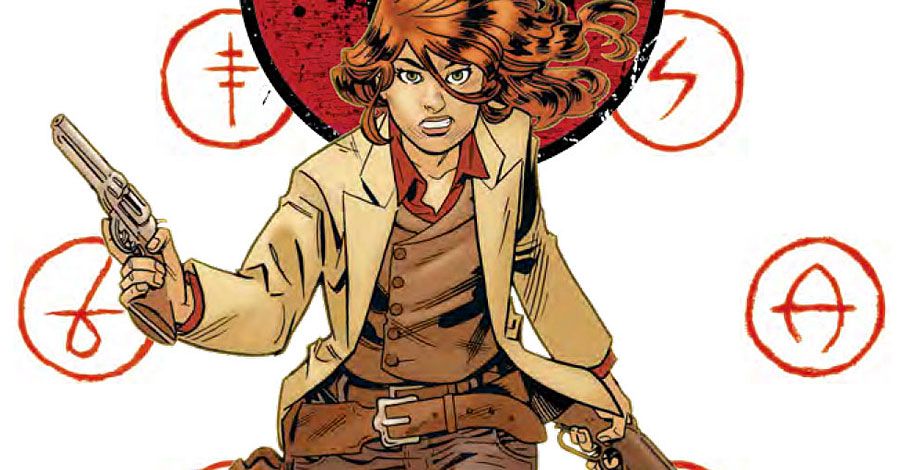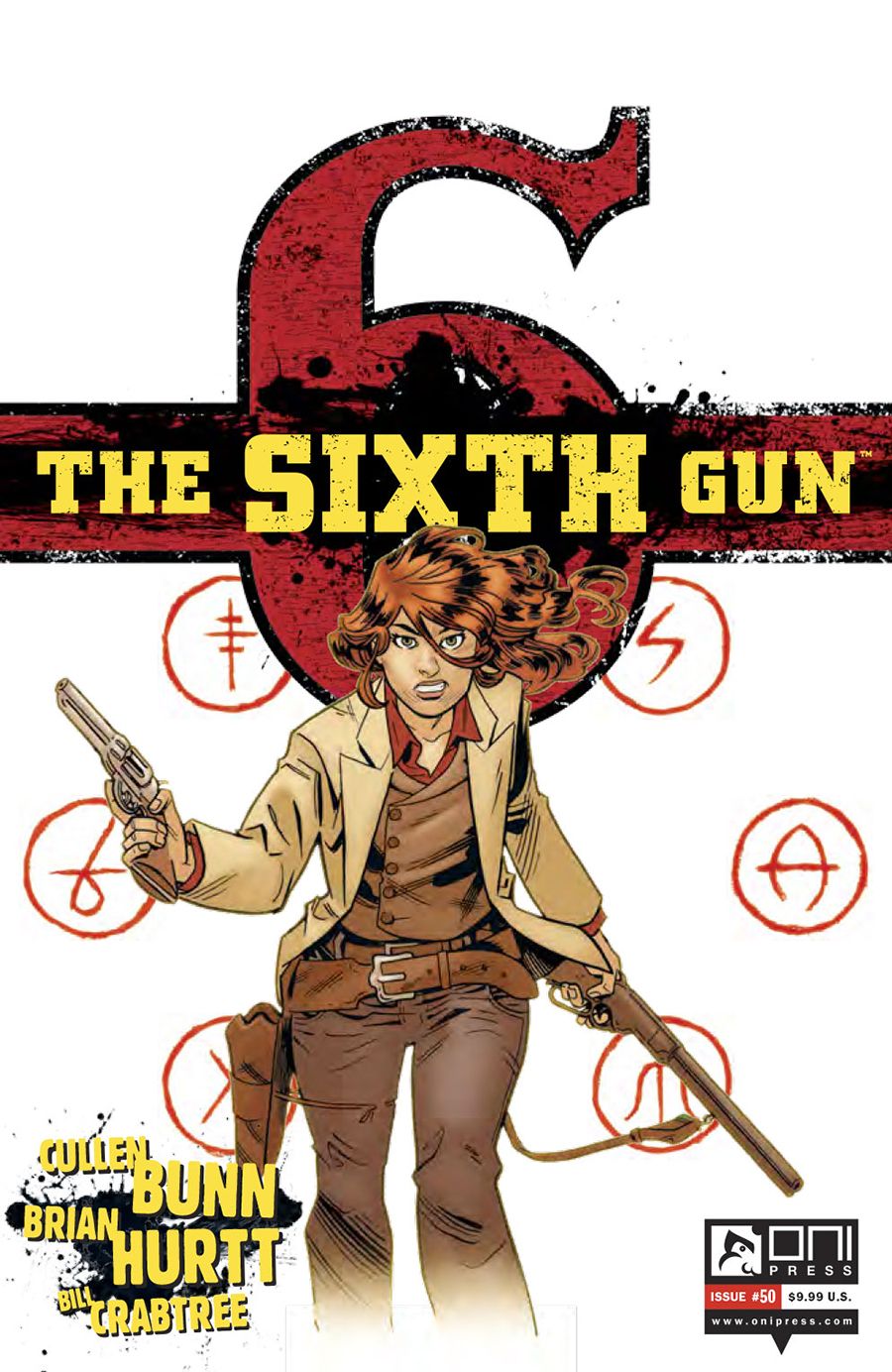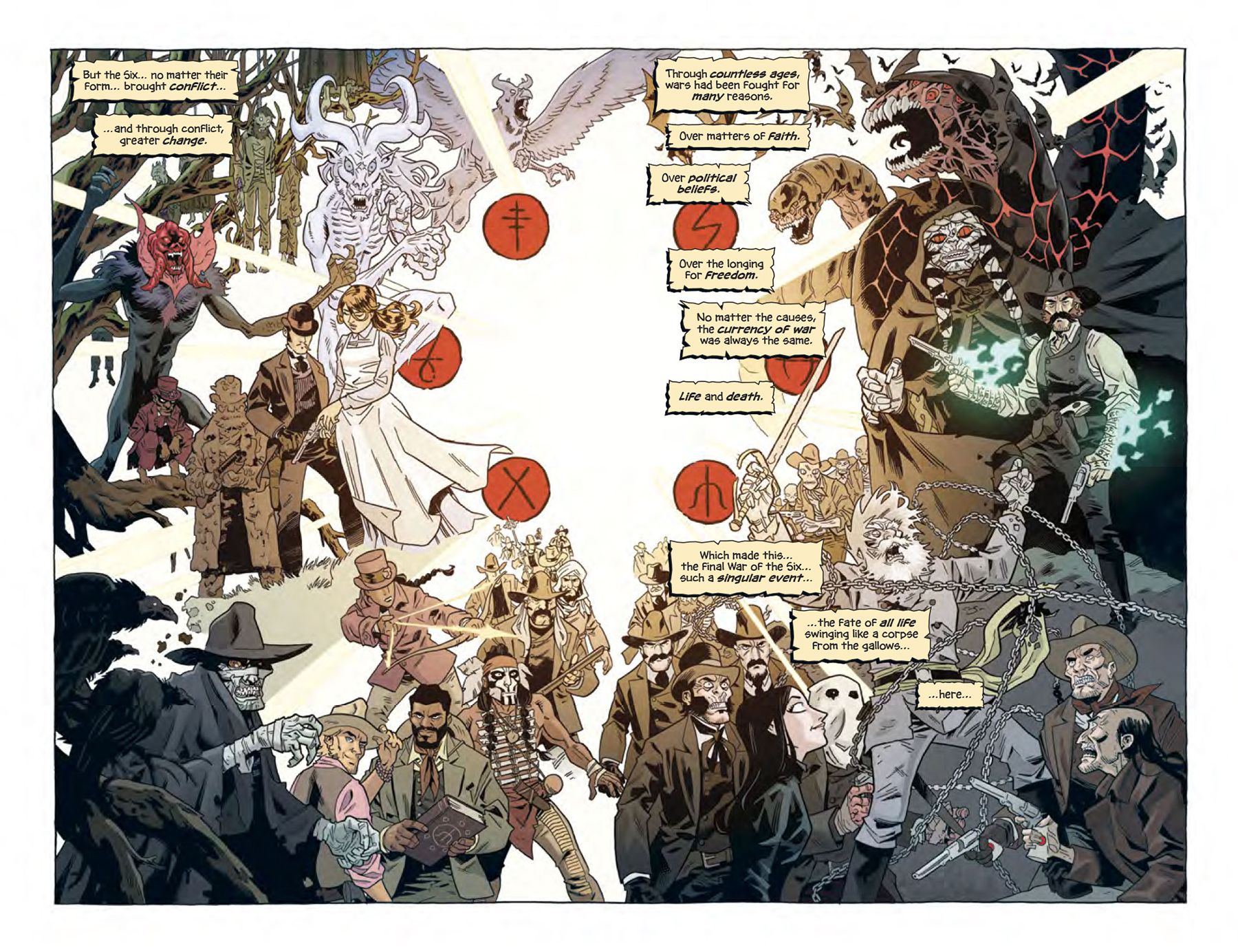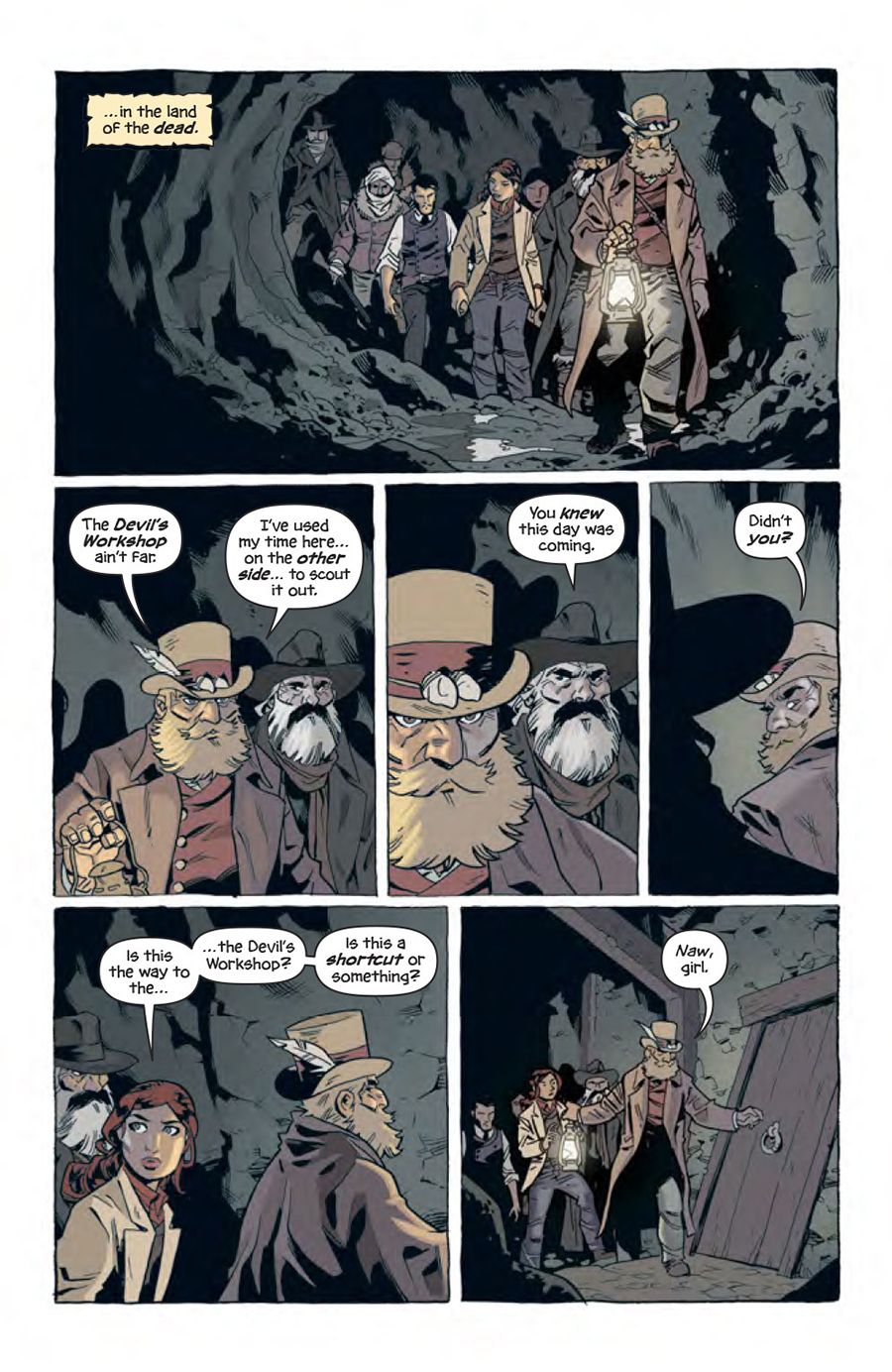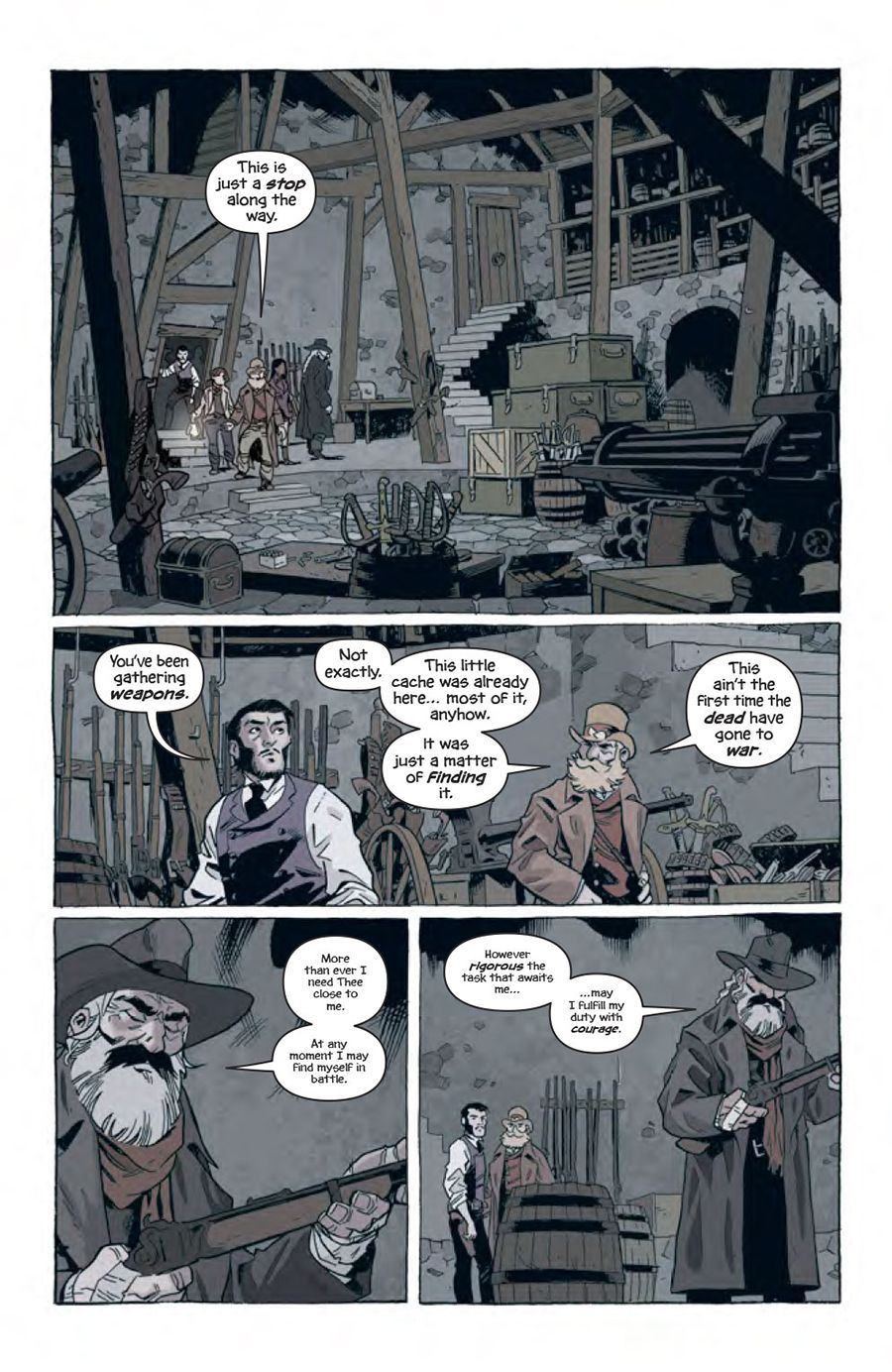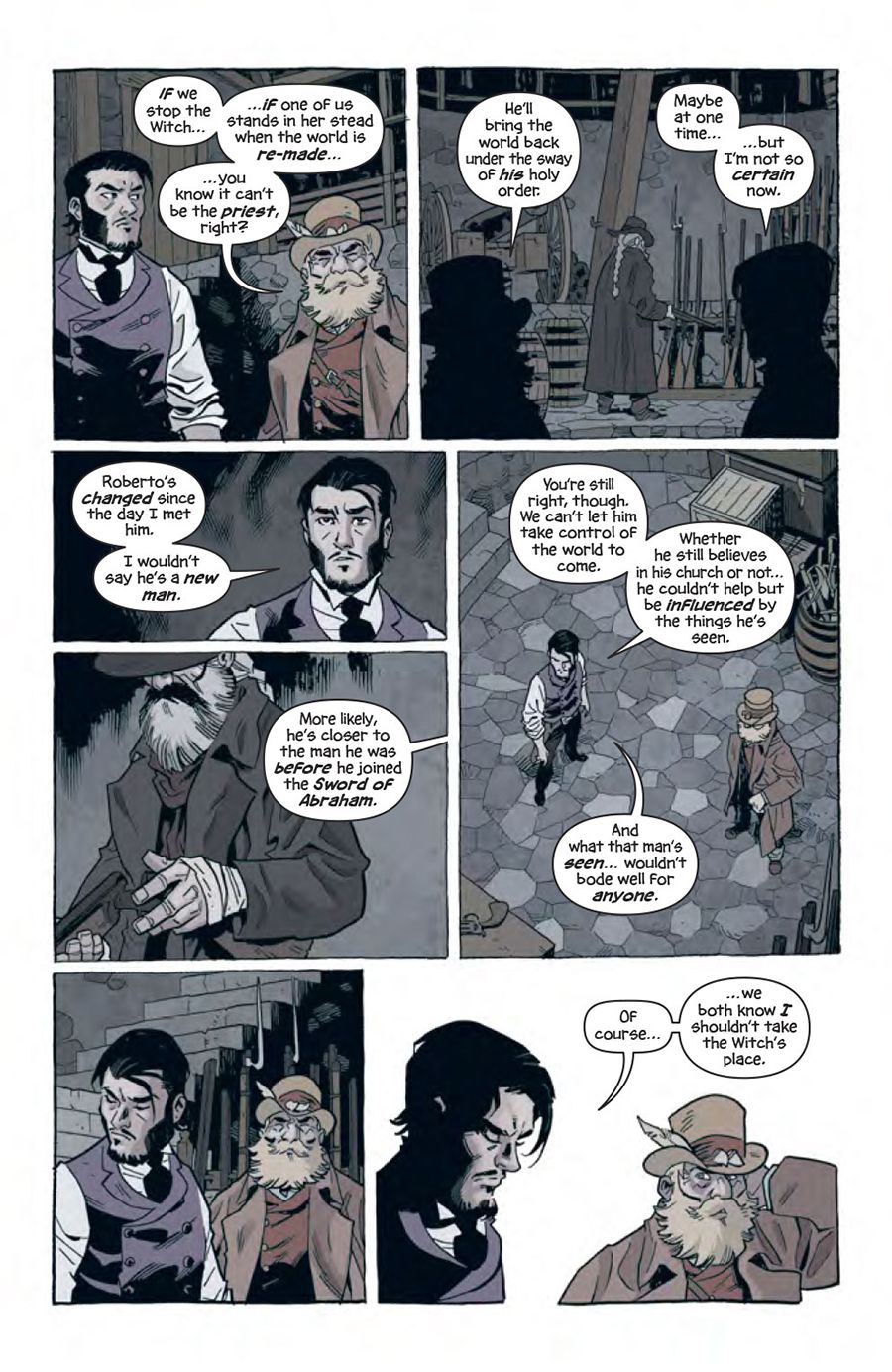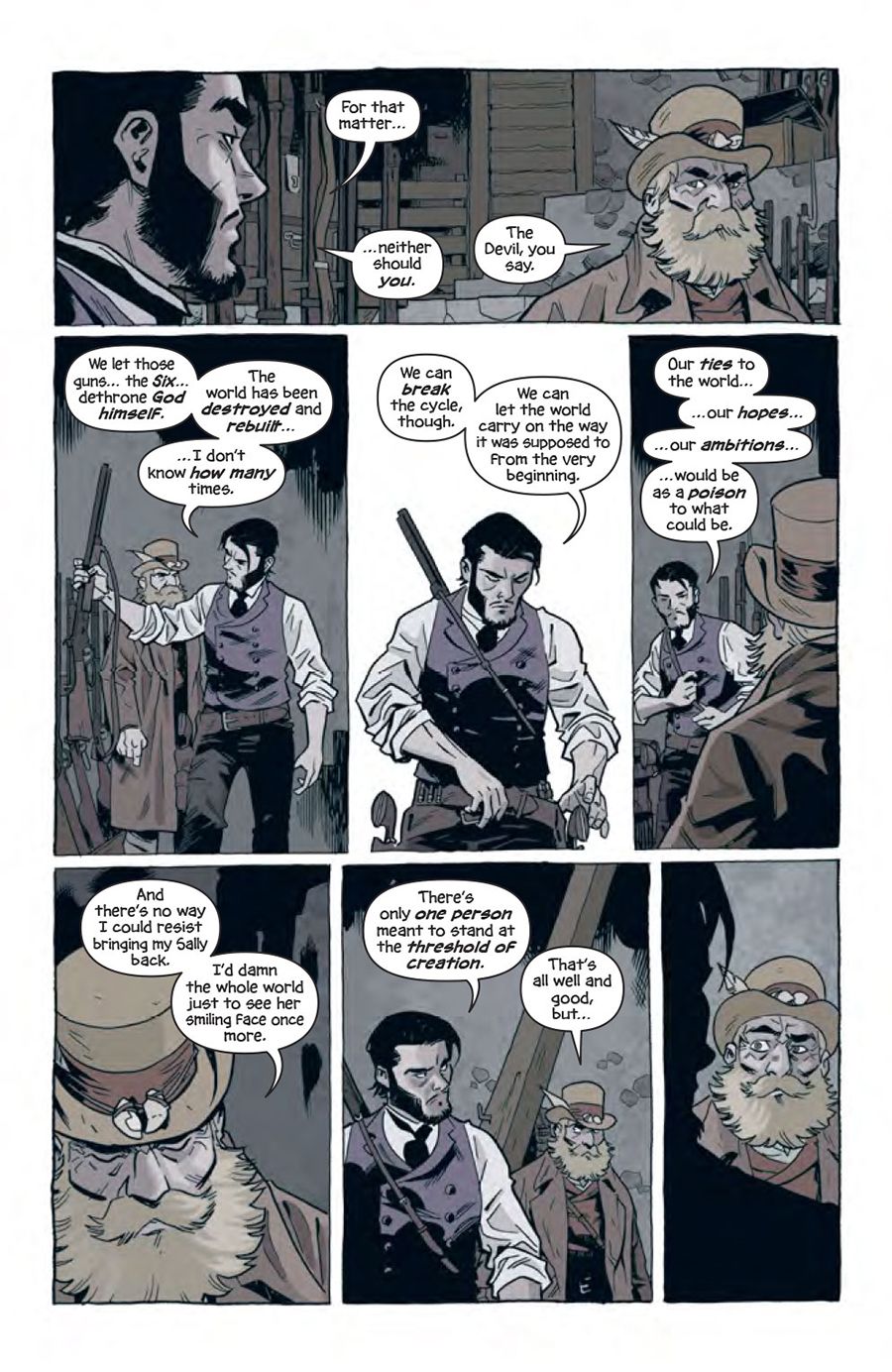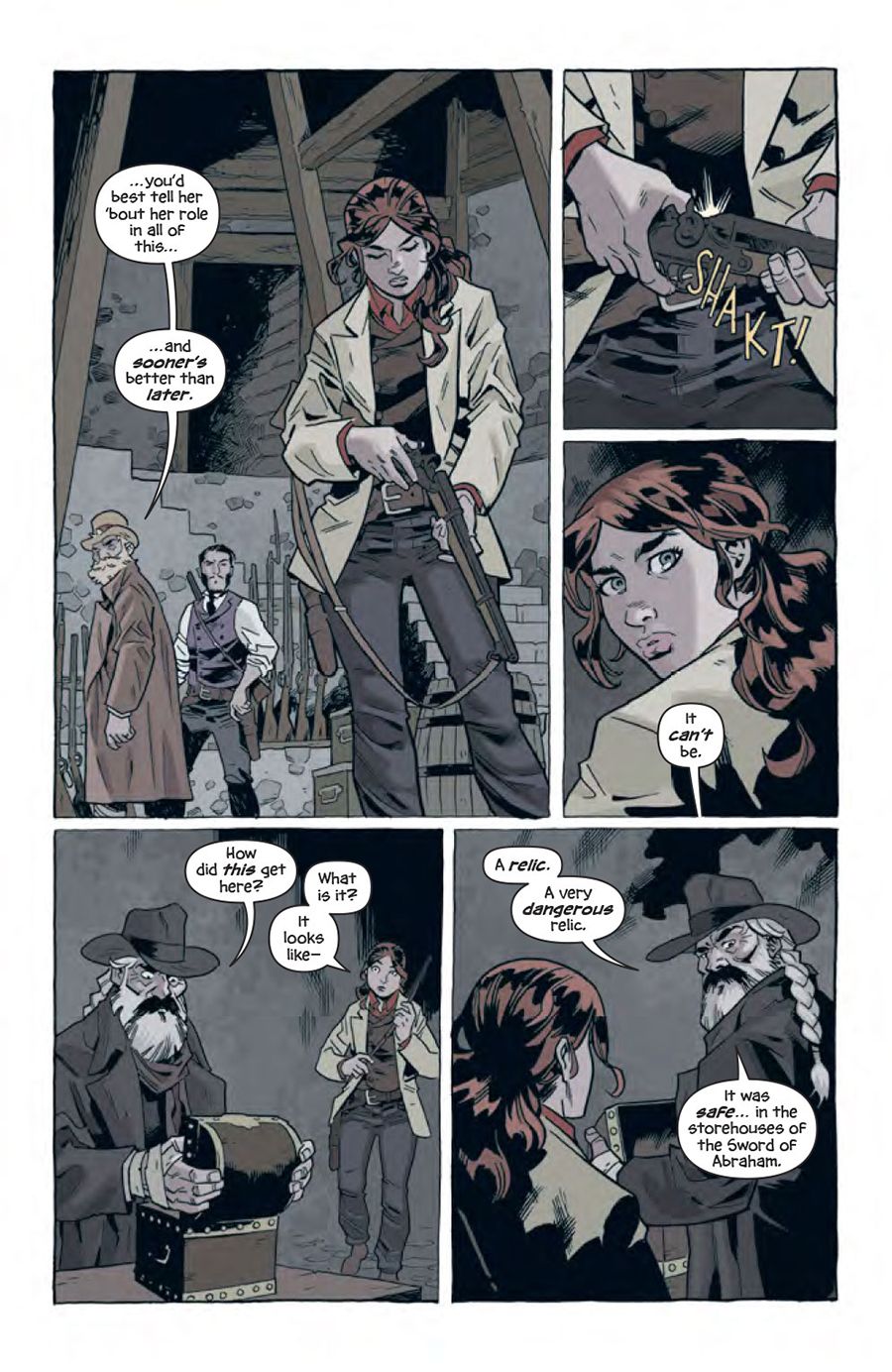Few creator-owned series release 50 issues, and even fewer are able to finish telling the story they want to tell. So when Cullen Bunn, Brian Hurtt and Bill Crabtree launched "The Sixth Gun" in 2010, the trio was unsure whether the book would last more than six issues. With the series concluding this week with a triple-sized issue #50, it's safe to classify the run, then, as an unmitigated success.
The Oni Press-published book began as a weird Western, but it was quickly apparent that the creators had far bigger ambitions for their tale. Looking back, it's clear that they wanted to tell an epic fantasy that was set in the American West, using the iconography of the region in much the way that so much fantasy has used European folklore and background.
To celebrate the series' conclusion, the three sat down with CBR News to discuss their creative journey. Without giving any spoilers for the last issue, we looked back on the series and what it's meant for them.
CBR News: When the book started, a lot of people thought of it as a "weird Western" but you made pretty clear early on that you had a much bigger story in mind. Looking back, it seems you wanted to tell this epic fantasy story using an American setting and iconography.
Cullen Bunn: I think we've always envisioned it as a "weird Western," but I think what people envision when they hear that term is different from what we did. We might have started out with this supernatural Western, or this horror themed Western, but we wanted to take it in a much bigger, more epic direction. I think a lot of people still refer to it as a horror Western story, and I don't think that's accurate. I think it's more of a fantasy Western, but still in my mind weird Western still applies. It's a story with Old West story elements but with a supernatural or fantasy angle.
Brian Hurtt: I think Cullen's original pitch and the seed of the series was more in line with what other people might perceive a weird Western. It was smaller, more intimate and more horror based, but pretty much once we got together on this book, the series kept growing larger and larger in scale and scope. It definitely took on its own voice, which I still think of as a weird Western or weird fantasy Western, really.
In rereading the series, I was struck by how good the first issue is, and how you set up the entire series with that issue.
Hurtt: All credit to Cullen. I still contend that's one of the best first issues ever written. Like you say, it sets everything up, it establishes the tone, it introduces the characters and it leaves you wanting more. I think it's a great first issue.
Bunn: Something we wanted to do with that first issue was establish that it was part of a bigger world. Right in the first few pages, we hint at this bigger mythology that had a pay off a long ways down the road, so to speak. I think we were trying to show off that this could be a bigger world and a bigger story right from the beginning. When we were working on the first issue, we didn't really know if the series was going to go past Issue #6. That was us saying, if the book doesn't go past six, let's at least give the people who read it something that they can regret they never get to see. [Laughs]
How has your approach changed over the course of the series?
Bunn: As far as the logistics of how we put an issue together, I think that's the same as it's always been.
Hurtt: "The Sixth Gun" wasn't our first project together. We had done eight-plus issues of content with "The Damned," so we pretty much established our working relationship. Cullen and I are really on the same page as far as storytelling. We have a shorthand and we pretty much understand where the other is coming from. It's pretty seamless. Bill, on the other hand. [Laughs]
The book has a very unique visual identity and a definite sense of place.
Hurtt: Absolutely. That's always been really important to me. I think place is a character as well, and things don't exist in a void. In order to immerse a reader in the story, you need to immerse them in the place as well. Bill can speak to that a little more because he brings a lot to the storytelling and the mood and the atmosphere and everything.
Bill Crabtree: I would agree that we haven't really changed much in the way we work, but I would say it's been very different from previous projects for me. There's a really strong sense of collaboration. Brian gives me a lot of color notes ahead of time, which I really enjoy. At the same time, if there's something that I feel strongly about doing differently, he's open to that. I've been invited to chime in on the story or how certain things are going to play out. I've definitely felt a lot more included. My point of view was more valued on this book than on anything I have worked on previously. Brian is really great, and just from the line art itself I get a lot of strong impressions and impulses about where to take the pages. He also gives me color notes that are often not so much literally nailing down what he wants as to give me an idea of the vibe he's going for. That really helps and inspires me as an artist to really try to follow my own instincts as far as where to go with things.
Hurtt: What Bill is saying also just makes me think of just the whole process. I know it's a cliche, but it's like a relay race with us. Cullen hands me the script, and what Bill is saying about my pages evoking or inspiring something for him, Cullen's pages do the exact same thing for me. I read them, and it gets me excited. I start immediately visualizing it and how I want to translate it to the page. It's cool to hear Bill has that same sort of reaction when I hand my part off to him. It's a real collaboration from start to finish. If it wasn't, I don't think any of us would have been interested in taking it this far.
Bill, so much of what you do is about setting and mood and tone, and here, you haven't been told what that means, but you're given the freedom to interpret that.
Crabtree: I don't know about all creative people, but I think a lot of times the best thing you can do for them is to make them feel confident in their decision making. The worst thing you can do is make them start second guessing themselves. I think you can get more out of somebody if you encourage them to go the way they feel they should. I think that, depending on how you approach the job -- not unlike the writing or the drawing -- there's so many hats you have to wear as a colorist, and a lot of them are some of the same hats the writer and the artist have to wear. You have to have some sense of tone, or you have to know how to clarify things, or you have to know how to establish that we've changed scenes. Because comics is such a reductive medium, you really have to try to wring everything you can out of them. I saw somebody bemoaning that there was no soundtrack to comics, and I said, well that's what the colorist is for. You need to make use of every aspect of the medium, because it is a very simple medium in the sense that it doesn't have a ton of elements or moving parts to it. I think to establish a sense of place with the color is as important as it is with the writing, as important as it is with the drawing.
Hurtt: Everything Bill said just comes down to storytelling. I think there's a lot of colorists out there who have great palates and good eyes, but they're not always the best storytellers. Bill is a very good storyteller through color. That's one of the reasons I love working with him. I think that's one of the things people respond to. You have three storytellers working on the book, and if you think it's a good book, it can be credited to that because we're all invested in it from a story point of view.
When I say that the book has a visual identity, each story arc and each setting looks and feels very distinct.
Hurtt: That's by design. Bill put a lot of thought into these things.
Crabtree: Cullen gives us a lot to work with. It really is one of the many reasons I really like working on this book. Some of the hardest stuff for me to color is when it's some nondescript dudes in a room talking, because I have nothing to guide me. Getting to color an Arctic world or a swamp or a desert or the afterworld, these are the kinds of things that, for me and Brian, this is the reason why you wanted to make comics. You never wanted to have a bunch of people sitting around on top of a building making Internet humor jokes. That's not why we wanted to do comics.
Hurtt: I've been working with Cullen for about ten years now, and I've been saying from the get go, I always knew he was good writer because I'd read his prose before we ever worked together. We were friends before that, but when I saw his first comics script, I was amazed that it was his first comics script. Like us, he was steeped in comics growing up, but he has an innate sense of the medium. I think he's one of the best writers in comics for that because he understand how to use the medium and that it is a visual medium and he writes that way.
The opening of issue #49 is very muted and gray, which probably makes people think of muddy colors, but Bill colors it so that it's textured and vivid.
Hurtt: There are so many ways that colors can take that scene. Because it opens up on a big muddy field, it could be a very murky looking scene, it could play too dark, it could be not very interesting, but Bill brings something to it. There's a play of color and it gives it that vibrancy.
That vibrancy is there throughout the book.
Hurtt: That was something we discussed from the very beginning -- stay away from sepia tones. We wanted to make this a pop Western from a visual point of view. It should have some of those superhero colors.
Crabtree: I think one thing that you're responding to is that it's not bright. It's muted. If you go from that scene to the next scene, there's definitely a difference in terms of how vivid the color is. What I think you're responding to is what I always try to have a sense of. Even if I'm dealing with colors that are very muted, I always try to have an idea of, but what color is that? Is it a purple brown? Is it a green brown? I think that's what helps gives it a sense of color, even though it's at a very low saturation.
I don't want to spoil anything about the final issue, which I've read, but I am curious about the tone of the ending.
Hurtt: Yeah, Cullen. [Laughs]
Bunn: This is where I fall back on seeing it as a Western. The Westerns that have always meant the most to me -- and have always stuck with me over the years -- have ended on more of a somber note. I just knew from the beginning that this wasn't necessarily going to have a happy ending.
Hurtt: As you're saying that, Cullen, I was thinking of the ending of "Shane." It reminds me of that, where it's a little somber, but also ambiguous. That's my take.
So many of the great Westerns aren't tragic, but they don't have a happy ending.
Hurtt: Yeah -- without spoiling anything, I don't feel it's a tragic ending. I think it's the right ending.
Bunn: It could have been a lot more tragic. [Laughs]
"Lord of the Rings" ends happily, but the tone isn't triumphant. The final pages of "The Sixth Gun" made me think of that.
Bunn: It's a little bittersweet -- to me anyway. This is the end of the road with these characters. I wouldn't have felt comfortable writing a big celebration at the end, or leaving it really open-ended. As I was writing it, I was a little somber because it's the end of the story and I think that came across on the page.
Crabtree: I literally got a lump in my throat coloring that big splash in that final issue. The image was kind of summing up the whole story, and we saw a lot of characters a lot of the story summed up in this one big image. It really did make me emotional. Not in the sense of some kind of a tragic ending, but in the sense of a nostalgic, "these are the days of our lives" moment. It made me realize how real they are to me.
The only thing I want to mention about the tone at the end of the story -- I'm going to try to do this as obliquely as I can -- is, I feel like it's somber, but it's not tragic because it involves decisions the characters make and that reflects on the content of their character as individuals. I feel like there's a dignity in the way that the story ends, even though it has a somber tone, because these are decisions these characters are making because of who they are. It makes me respect the characters more.
I tend to avoid asking what's next, but you guys are all working on what's next. Brian, your graphic novel, "Poppy and the Lost Lagoon" is out this month from Dark Horse.
Hurtt: I did an all-ages graphic novel with Matt Kindt, which he wrote and colored and I drew. It's a lot of fun. It's a very different style from what people have seen from me on "The Sixth Gun." It's a little cartoonier and looser, and it was a very fun project. It was something that started off almost as a lark that he and I were doing in our free time, and it grew into this graphic novel. I'm really excited.
Bill, you're always busy. I know you're working on "Past Aways" from Dark Horse and some other projects. You're not slowing down.
Crabtree: I've always been slow. [Laughs] I'm a slow colorist. I seem to find myself on a lot of books that have a lot of stuff on every page. [Laughs]
Cullen, your career essentially can be summed as before "The Sixth Gun" and after "The Sixth Gun," where people can't even keep track of how many books you're working on for Oni, BOOM!, Marvel, Dark Horse, Dynamite, DC --
Bunn: Sometimes I can't either. [Laughs] You're absolutely right. Brian and I did "The Damned" with Oni, and that's a book we were both very proud of. At the time, I thought, "Well, that's it. The door is now wide open. Publishers will come running to work with me." That did not happen. [Laughs] I remember I sent an editor "The Damned" and a pitch for something -- and the note was really wonderful -- "We don't know that you'll ever write anything that's this good again. This may be the best you can write." [Laughs]
Hurtt: Cullen got them fired when he became a big shot.
Bunn: They were out of comics before I was really in. But "The Sixth Gun" was a different story. There were more eyes on it than "The Damned," and I think it spoke to a lot of editors. That, really, is what opened all the doors that have been opened for me.
Have you guys begun talking about your next project together?
Bunn: There's so much collaboration involved, I really don't think I can handle any more. [Laughs]
Hurtt: I think we can say that we definitely have a project coming up next year. That's underway. I think we can say we have one or two other projects at different stages of gestation. I think that's all we can say.
Bunn: The bottom line is, I'll work with these two guys as long as I can and they're willing.
Maybe another "Sixth Gun" spinoff miniseries?
Hurtt: What do you want to say, Cullen?
Bunn: It's always possible. The world of "The Sixth Gun" is a very big world that we established. I think it's safe to say that the story of these characters we have brought to a close with issue #50.
Hurtt: What he said. Their story is done, but there are a lot of other stories out there. This isn't a secret, but we would love to return at some point. We do own it, so we could come back to some corner of this world and do something in it. Whether or not that happens in the near future, I'll leave that unanswered.
Is there any chance of a spinoff with Gord, Asher and Kirby having weird adventures?
Bunn: I just did another interview and said that's the one spinoff I really wish we had done.
Hurtt: With a musical number, like "Rio Bravo."
"Rio Bravo" is my favorite Western.
Hurtt: It's my favorite Western, too.
Bunn: It's a great movie, but it's not my favorite Western. C'mon, guys -- it's great, but you keep forgetting "The Outlaw Josey Wales."
Do you have a favorite "Sixth Gun" moment that stands out for you?
Hurtt: If you point out different story arcs, I could go, I love this bit, I love that bit, but I genuinely never got tired of the book. There's something in every arc and every issue that I love. Nothing stands out. I can tell you some things that I hate. [Laughs] I hated drawing the General's chains, but everybody knew that.
Bunn: Like Brian, there's so many pieces of this that are my favorites that I can't narrow it down to one particular scene. There are moments. There are even lines of dialogue. When Drake calls the General a mean, old spider, I like the way Drake looks. [Laughs] There's a moment in issue #50 towards the end, between Billjohn and Becky, where I got a little choked up writing it. It's a line that people could see as a throwaway if they're reading very quickly, but something about that choked me up a little writing it.
Crabtree: I would agree, but my favorite thing about working on the book in general is just the scope of it. The range of what I get to color, and the places the story ended up going. I think there were a few different moments for me where, as the pages were coming in, I realized, wow, this story is so much bigger than I realized. Like the end of the first story arc, and then getting into the New Orleans story -- that was the first time I thought to myself, "I thought I knew where this was all going, and now I'm realizing that I never had the measure of it at all." Another really distinct time that happened was when Becky is dream walking, and she comes through the forest and enters a clearing. Its a big, two-page image, she's looking up and there are dragons flying through the air. That was a big moment where I was just really impressed with the story and what it means to say this takes place in a world where the supernatural is real.
Fifty issues of a creator-owned book is a big accomplishment. Having done this --
Hurtt: Never again. [Laughs]
Bunn: I always lean towards wanting to tell longer stories. I don't know that I would ever do a creator-owned book that is 50 issues. Who knows? I might have an idea that needs 50 issues, but as much as I love long form stories, I don't know that 50 is going to be in my near future.
Hurtt: I think Cullen and I have the exact same thoughts and reactions. Fifty might be too much, but I also love long form stories. I love taking the time to get to know the characters and get invested in the story. 50 issues is a giant undertaking. You start counting these projects in years. That said, who knows? Something could strike and we feel like we have to do 50 issues and we want to do 50 issues like with "The Sixth Gun." Never say never.
Crabtree: I colored 50 issues of "Invincible," and then I quit. [Laughs] I still had a few more issues, but they could tell l was reaching my limit.
Hurtt: The final issue is like three issues long. A few of the issues were extra pages, plus you colored two of the three miniseries as well, so you have more "Sixth Gun" issues under your belt than "Invincible."
Crabtree: That's true. I was definitely reaching the end of my tether. [Laughs] I'm looking forward to the new thing. What I always liked about working with these guys is just the range of scenes and characters and locales and ambiance that I would get to work on. I'm definitely looking forward to our upcoming things, because I think they're all going to be equally inspiring and exciting.
"The Sixth Gun" #50 arrives Wednesday, June 15.

